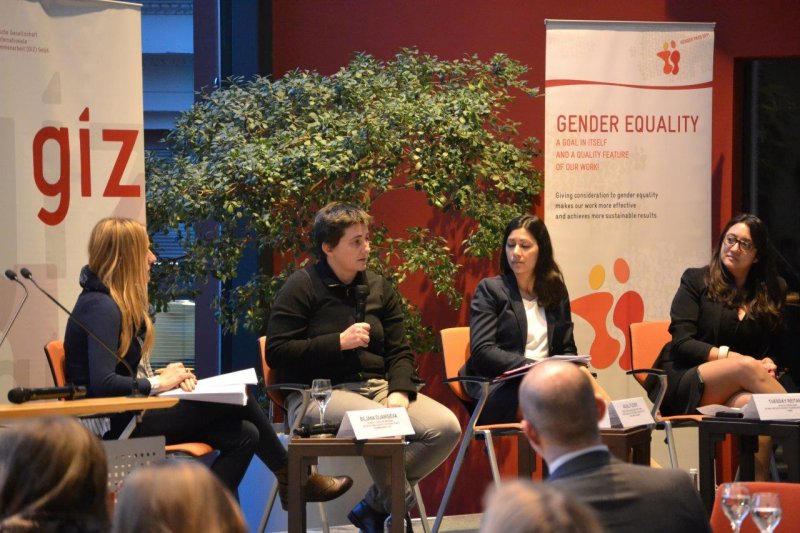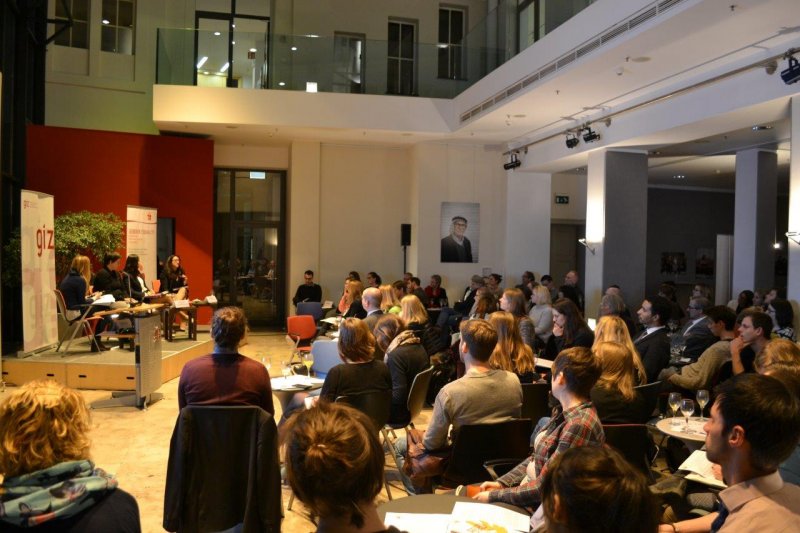Hotline: +381 61 63 84 071
Berlin: Migration and Human Trafficking: Examining the Gender Dimensions

NGO Atina's representative presented the expertise and long-time work of this organisation on the cases of human trafficking and gender-based violence, which was the reason to become involved in providing support to those persons within the refugee population who have been recognised as the most vulnerable
‘Working with refugees and migrants in Serbia, I often meet women and girls whose injuries tell a story about a long and dangerous journey!’ stated Marjiana Savic, the director of the NGO Atina. In cooperation, with the GIZ project Social Rights for Vulnerable Groups on the Western Balkans, the NGO deals with female migrants and refugees on the Balkan route and advices them on a daily basis. Migrants and refugees on their way to Europe are increasingly exposed to dangers, such as human trafficking. As a part of its Gender Week, the GIZ therefore organized the panel discussion ‘Migration and Human Trafficking: Examining the Gender Dimensions’ around the complex topic of human trafficking. The event brought together representatives of different international and civil-society organizations who reported about their experiences with the topic. Furthermore, the head of the task force displacement and migration at the BMZ, Elke Löbel, and Cornelia Richter, member of the GIZ’s executive board, discussed how human trafficking and migration is included into the current development agenda.
‘Additional to short-term responses to the current refugee and migration situation we need long-term development projects that create better life prospects’ stated Elke Löbel the BMZ’s position on the current situation. Due to her own experiences with female victims of human trafficking during her earlier work in women’s shelters in Bolivia and because of her current position as the head of the task force displacement and migration at BMZ, Elke Löbel is very familiar with the issue. ‘We need to collaborate with all levels, including the state, the legal system, the police and civil society. However, most of all we need to gain the women’s trust!’
Agreeing with Ms. Löbel, Cornelia Richter stressed the importance to include civil society actors, such as the NGO Atina, into the GIZ’s work. ‘Even though migration provides a lot of potential with regard to knowledge transfer and innovation, we must also look at particular issues in a more differentiated way. Risks, such as human trafficking and the thereof resulting gender-specific challenges need to be considered as well’.

Since a couple of years, the international network of the Global Initiative against Transnational Crime (GI) is doing exactly this. Tuesday Reitano, GI’s Head of Secretariat, noted in her introductory presentation that ‘human trafficking is a global crime with great regional differences. More than 60% of the victims are women and girls’. Yet human trafficking is still not in focus of development policies. Similar to other organized crimes, however, it hinders the realization of important development goals. Human trafficking occurs within borders, as well as transnationally and includes mainly issues linked to sexual exploitation and forced labor. ‘Migrants and refugees are in particular vulnerable to become victims of organized crime as they are often either lured by false promises or simply don’t see any alternatives’ explained Reitano. Therefore, only education and information about associated risks of human trafficking serve as protective measures, as Anjali Fleury, a researcher at the Global Knowledge Platform on Migration and Development (KNOMAD) of the World Bank, highlighted. ‘Powerful migrants are those who are well-informed’ was therefore the message of the GIZ and BMZ this evening.
Biljana Dijanisieva, a GIZ advisor in Macedonia, who moderated the panel discussion, approved the message. When it comes to migration issues, gender should not be considered as an after-thought but rather from the beginning on, so that measures can be tailored to the needs of certain groups. Otherwise, gender-specific challenges and particular issues of women and girls are not taken into consideration. Moreover, migrants, refugees as well as all victims of human trafficking should not only be seen as passive victims but instead be empowered in their roles as actors. Thus, refugee and migration issues require innovative, gender-sensible and holistic approaches while migrants need information in order to have access to their rights. ‘As long as there are no legal ways for migration, people will migrate through irregular channels and hence unintentionally end up in very vulnerable situations’, concluded Biljana Dijanisieva.
KNOMAD research "Understanding women and migration" can be found on link http://atina.org.rs/en/knomad-understanding-women-and-migration
More pictures you can find here http://atina.org.rs/en/berlin-migration-and-human-trafficking-examining-...
Original text you can find at following link https://gc21.giz.de/ibt/var/app/wp385P/2371/index.php/gw2016/migration-a...












 FACEBOOK
FACEBOOK TWITTER
TWITTER YOUTUBE
YOUTUBE